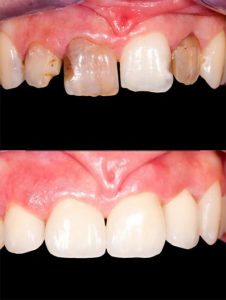Dental Crowns and Bridges
Dental Crowns
A dental crowns (or cap) is a tooth-shaped cover placed over damaged or decayed tooth. In such cases, the tooth severely damaged such that a filling cannot restore the tooth. A crown is stronger as it can hold broken parts of a cracked tooth together.
Crowns can also be used for aesthetic value. When placed over badly discolored teeth, they improve the appearance of the tooth.
Uses of crowns
Crowns are like tooth-shaped caps that entirely cover the damaged tooth. They tend to be more robust than dental fillings, thus strengthen damaged teeth.
Uses of crowns include:
- protecting weak teeth from fracture
- covering dental implants
- covering discoloured teeth
- covering a tooth that has received root canal treatment
- replacing a large filling
- attaching a bridge

Dental Bridges
A dental bridge is more or less like a bridge created to fill in gaps created by missing teeth. It is made up of two or more crowns on either side of the gap, and a false tooth in the middle. The crowns are supported by either natural teeth or dental implants. The false tooth is attached to the crown and fills in the empty space between the crowns.
Root canal treatment might be necessary for unhealthy teeth receiving the crowns. It is also likely that parts of the teeth will be removed to make space for the crowns.
The procedure often requires more than two clinic visits. During your first visit, your dentist will prepare your teeth and install temporary crowns. They might also create impressions of your mouth profile. They install the bridge in later visits after the preparation procedures are complete.
Care for dental bridges
Bridges, on average, last for about five to seven years. However, if proper care is given, they can last for a longer period. Poor oral hygiene could lead to development of cavities on the supporting teeth. This shortens the life span of the bridge. Thus, it is important to keep your maintain proper oral hygiene to preserve your bridge.

